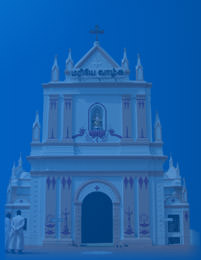
 ARCHDIOCESAN BOARD OF EDUCATION
ARCHDIOCESAN BOARD OF EDUCATION 
Constitution of the Board
Inorder to coordinate, monitor and support all the educational institution, the Archdiocesan Board of Education was constituted in the year 1993, and a Constitution also was framed and promulgated in the same year. The constitution proposes clear policies and norms regarding and missions of students.
Taking into consideration the changes that have taken place in the field of Education in the Archdiocese thanks to the newly started institutions and upgrading of institutions, a revision of the Constitution was felt a necessity and the redrafting started one year back and it is almost in its final shape.
Appointment of Teachers in the Educational Institutions in the Archdiocese
Candidates Possessing Secondary Grade Certificates are appointed in Standard One to Fifth. Selection of SGT’s is done based on the year of passing the SGT examination. So far the candidates who have passed upto 2003 have all been posted. During this selection in addition to the marks they have secured in the TTI examination, special marks are given to the community to which they belong. Candidates belonging to Scheduled Caste are given more marks. Consideration is shown to the economic background of the Candidates, their Conduct & Character and knowledge in the Catholic religion.
High and Higher Secondary Schools and Training Schools
Candidates possessing the required qualifications are appointed in the High and Higher Secondary Schools.The posts that are available in these schools may be either Government aided or Self-financing.
Whenever a Government aided vacancy arises, Candidates who are working in our High and Higher Secondary Schools on consolidated pay under a self-financing system are promoted to the Govt. aided post based on their years of experience. The government aided posts are being funded by the government. The self-financing post are funded by the schools for this purpose certain amount of fees is collected from the students. School facing shortages of funds are supplemented by the Archdiocese. Naturally there is lot of difference in the pay scales.
In this two-tier system, no candidate can straightaway get into a government post in any one of our institutions. First, one has to serve on consolidated pay and after some years of service, he / she will be fitted into government aided post as and when vacancy arises.
In all such vacancies only Catholics are recruited. In case of non-availability of Catholic Candidate, Candidates belonging to the other religions are also considered. In the selection of Catholic Candidates, preference is shown to S.C. Candidates.
Colleges
In the appointment of candidates in the College, as stated above Catholic Candidates are preferred to non-Catholics, and S.C. students are given preference. There is a dearth of eligible Candidates for the post of lecturer in a college.
Admission of students in school and colleges other than Teacher Training Institute and B.Ed. College.
All the catholic students who apply for admission in these institutions are all admitted, irrespective of the caste to which they belong.
Thanks to the upgrading of middle schools into High Schools and the upgrading of High Schools into Higher Secondary Schools. In some of the important villages, quite a good number of students who would otherwise have discontinued their studies are able to pursue their studies upto the High, Higher Secondary level and many pursue up to graduated and Post-graduation studies.
Admission in B.Ed. College
The Archdiocese runs one B.Ed. College is completely unaided and self-financing. Due to the Court direction certain percentage of seats has to be reserved to non-catholic student for some year. Now this restriction has been removed; we are allowed to admit most of the Catholic candidates. Moreover besides three more B.Ed. colleges have been started by Religious Congregation within the Archdiocese. Hence there is practically no difficulty for catholic students to get admission in B.Ed. College.
In the year 2012 the Government has introduced TET (Teacher’s Eligibility Test) to which the board has to confirm with the norms and regulations of the Government.
Scholarship
Apart from the Tamil Nadu Catholic Bishop’s Scholarship which is extended to only Dalit Students who are pursuing pro final education and Diocesan Scholarship is given to all candidates pursuing professional education, in colleges to deserving candidates.
 PONDICHERRY CATHOLIC EDUCATIONAL ASSOCIATION (PONCEAN)
PONDICHERRY CATHOLIC EDUCATIONAL ASSOCIATION (PONCEAN) 
MEMORANDUM OF ASSOCIATION
- Name:The name of the Association is “PONDICHERRY CATHOLIC EDUCATIONAL ASSOCIATION.” The short name will be “PONCEAN”. Hereafter referred to as ‘Association’.
- Office:The registered office of the association shall be situated in Pondicherry at No.206, Archbishop’s House, Cathedral Street, Pondicherry 605 001.
-
Objectives of the Association:
The Association is established for the purpose of carrying out the following objectives:- To promote good understanding and co-operation among the affiliated catholic educational institutions.
- To help the member institutions by giving guidance as may be beneficial to them and which is within the reach of the association.
- To offer suggestions to the functioning of the educational institutions in the light of any new rules or regulations introduced by the Central and State Governments, The Department of Education, Other Departments or any other local authorities.
- To provide forum for full and free discussions on all matters of interest.
- To work in collaboration with the Educational and other authorities in the advancement of any of the objectives contained herein
- To promote and safeguard the interests of all the Catholic educational institutions, their staff and students.
- To represent the views, aspirations, grievances and other matters affecting the member institutions to the Government of the state or the Union Government or any other authorized body and to take such legal and / or contractual rights in a Court of Law through duly appointed legal advisers of the Association.
- To promote Education: Religious, Moral and Secular according to the Christian ideals and the interest of the National Development.
- To collaborate wherever possible with other Institutions and Associations having similar objectives.
- To promote and conduct studies and research in education and other disciplines on the different subjects relating to education.
- To represent and advice the members about the innovations, technical knowhow, demands and potentials, to collect statistics, to publish or circulate or inform the members by way of Newspapers, bulletins, circulars, electronic media, etc.,
- To acquire to the same extent as natural persons might or could do, to acquire by purchase, lease, mortgage, loan, gift, donation, subscriptions, souvenir advertisement, charity shows, legacy, bequest, exchange, right, privilege or otherwise from any persons, society, or institutions or anybody whatsoever movable and immovable properties of all descriptions deemed necessary or useful for any purpose of the association.
- To invest and deal with any money or property of the association, not immediately required, for any of the aforesaid objectives on such terms and in such manner as the Association may deem fit.
- To do generally all activities for the benefit of members and the public and to accept / give donations, gifts, prizes, scholarships, honoraria, assistances etc either in cash or in kind or otherwise.
- To do all such matters and things necessary, conducive, incidental or ancillary to promote and further the objectives of the Association.
- All the incomes, earnings, movable or immovable properties of the Association shall be solely utilized and applied towards the promotion of its aims and objectives only as set forth in the memorandum of Association and no portion thereof shall be paid in any manner whatsoever, to the present or past members of the association or to any person claiming through anyone or more of the present or past members. No member of the association shall have any personal claim on any movable or immovable properties of the association or make profit, whatsoever, by virtue of his membership.
 DIOCESAN ORGANIZATION OF SCHOOLS (DOS)
DIOCESAN ORGANIZATION OF SCHOOLS (DOS) 
In India, The Right of Children to free and Compulsory Education Act, has become operative from April 1st 2010 onwards. The RTE Act essentially seeks to empower the marginalized section of the society by providing them access to the knowledge that will enable them to enter the main stream of Indian life and claim their lawful place in Society. In the archdiocese of Pondicherry, the MEP Missionaries more than one hundred years ago started schools in the remote rural areas. Through Educational ministry, they had done the Evangelization in our Diocese.
D.O.S. is the central Coordinating agent of the administration of all the primary schools in the Archdiocese of Pondicherry & Cuddalore. Though our MEP Fathers founded a lot of schools in the rural and urban areas before and after the 1st Synod of Pondicherry in 1844 (in which the option was decided for evangelization through Educational ministry), no Coordinating organization was formed until 1918. It was Rev. Fr. Thomas Gavan Duffy who was the first inspector of the Mission Schools had acted as the coordinator of all schools of the region. During that time there were around 250 primary schools, spread all over the Diocese. It was this MEP Missionary who worked hard to coordinate the Educational activities by training the teachers, appointing them in schools, and printing guide books for promoting education. He was the one who unified the programmes of instructions both secular and religious. This is how the D.O.S. has become the primary instrument of Evangelization of the missionaries of MEP.
 ARCHDIOCESAN EDUCATION FUND
ARCHDIOCESAN EDUCATION FUND 
A Story of Education leading to Living with Dignity
In the opening speech of the 1844 synod of Pondicherry Msgr. Clement Bonnand put forth to the missionaries present, the agenda to start new schools and educate both the rural and the urban children of the region. Providentially, the Archdiocese has always felt the importance of education and hosted numerous plans to realize it. Following the legacy of his predecessors our Archbishop Dr.Francis Kailist from his very day of his installation was doing all that he can to empower the children and the youth by assisting them monetarily to have a dignified future through education. He has sensed and thoroughly analysed the literacy pulse of the Archdiocese and concluded that education is empowerment.
The Archdiocesan Education fund:
LOCAL CONTRIBUTION: This includes the amount contributed by the Parishes, Institutions, individuals, well wishers and benefactors within the country instead of bestowing gifts and shawls on the Archbishop during his visits.
The Archbishop’s preferential option for the liberation and development of the schedule castes, poor and the marginalized can be very well sensed by his education mission to the faithful of the Archdiocese. The education mission of the Archbishop would have been an unrealized dream if the Priests of the Archdiocese, our faithful from different parishes, well wishers, and his personal benefactors shrunk their generous hands. Our deep sense of gratitude flows to each and every one of them.
Free education seems to be existing only in the land of Utopia. This Utopian reality has to be fuelled to become a tangible reality. The economic situation of our Country push many of the families to say “no” to the education of their children even if there exists a deep thirst for knowledge. As we live in this land the situation of our Archdiocese is no better than the situation of our Country. They are not educated because they are poor. The Archbishop was firm in disproving this proposition, for him poverty should not be a defeating cause to deny education to those who really have a deep desire to learn. This strong resolve of the Archbishop made him to establish the Archbishop’s education fund.
 ARCHDIOCESAN EMPLOYMENT REGISTRATION SENIORITY LIST
ARCHDIOCESAN EMPLOYMENT REGISTRATION SENIORITY LIST 
Please note the following points before proceeding to see your details
- It is not the seniority list of the teachers who are working in consolidated posts.
- The present list is updated till 10.07.2023.
- Those without UG qualification are shown separately under the title “Without UG qualification.”
- If anyone has any grievance in the list that person can approach the archdiocesan education board office on any one of the working days.
Secretary
Rev. Fr. G. Peter Rajendiram M.Sc., M.Ed., M.Phil.
Episcopal Vicar for Education
- The Pondicherry Mission in 1700 A.D
- The Presence of the MEP
- Mgr.Pierre Brigot (1776-1791)
- Mgr Champanois (1786-1810)
- Mgr.Hebert (1810-1836)
- Mgr.Bonnand (1836-1846)
- Mgr.Godelle (1861-1867)
- Bishop Laouenan (1868-1892)
- Archbishop Gandy (1892 1909)
- Archbishop Morel (1909-1930)
- Archbishop A.S.Colas (1930-1955)
- Archbishop R.Ambrose (1955-1973)
- Archbishop V.S.Selvanather (1973-1992)
- Archbishop Michael Augustine (1992-2004)
- Archbishop A. Anandarayar (2004-2021)
- The chronological Tree of our Former Prelates
- Contribution of our Archdiocese to Holy Mother the Church











